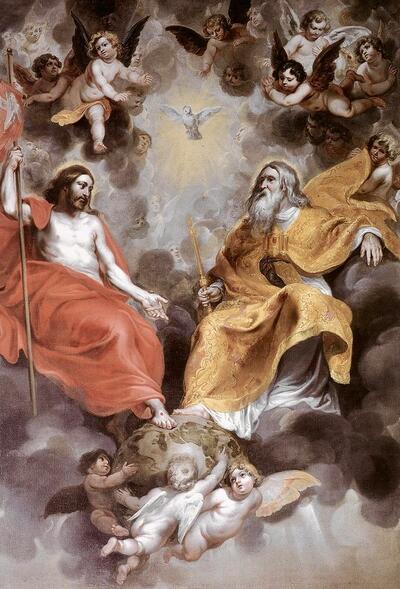The Trinity: Mystery as Invitation
The Central Mystery of Faith
(That’s a good thing.)
Blessed Trinity Sunday!
What we say and hear about the Trinity on this feast often tends to be apophatic—that is, expressed in negative terms. Statements such as these are apophatic:
“We can’t box God in!”
“We will never fully understand the Trinity.”
“St. Augustine once said that trying to understand the Trinity is like trying to put the whole ocean in a little sand pit.”
It is true that Christian theologians and saints consistently agree that we cannot limit God, and much of the work of theological debates and Church councils over the centuries have explored what can be said of without veering into error. Joseph Ratzinger (Pope Benedict XVI) commented:
We can only speak rightly about (God) if we renounce the attempt to comprehend and let him be the uncomprehended. Any doctrine of the Trinity, therefore, cannot aim at being a perfect comprehension of God (Introduction to Christianity).
At the same time, the entire story of salvation history and of Christian faith centers on the premise that God generously and gratuitously desires to reveal himself to humanity–and that God does so through self-revelation to the people of Israel, then by coming to us as the Word made flesh in Jesus, and sending the Holy Spirit. With each self disclosure (not just in fact or statement, but in self gift), we are better able and invited to share in the life of God. Since that is so clearly positive rather than negatively mysterious, I would like to propose a more positive definition for our understanding of the Trinity as a mystery. A mystery in faith is an infinitely knowable reality revealed by God that we are invited by God to share in. If my one God:--Father, Son, and Holy Spirit: the Trinity–is infinitely knowable then I am able to come to know and love God more and more, eternally.
Imagine as an analogy that a man who has been married for decades says with a heavy sigh, “My wife is a mystery; I’ll never understand her.” You might presume that he speaks with a tone of annoyance or resignation. But if that man instead says with a glint of humor in his eye, “after all these years, I’m still learning about her, and she always surprises me!” We can instead imagine that he views what is still unknown about his wife with delight and joy. He views her as a mystery, but sees that as a wonderful invitation, rather than as a problem or conundrum.
If we take this more positive formulation of understanding mystery, rather than giving up before we start to attempt, we can then better reflect with Scripture and the Tradition on what we can say about God. The Catechism states:
“The mystery of the Most Holy Trinity is the central mystery of Christian faith and life. It is the mystery of God in himself. It is therefore the source of all the other mysteries of faith, the light that enlightens them. It is the most fundamental and essential teaching in the "hierarchy of the truths of faith" (CCC 234).
Since the Trinity is the central mystery of Christian faith, we are lucky to have more than 2,000 years of Christians trying to speak of God. So here are three things we can say positively, given the doctrine of the Trinity:
- The Trinity means God is inherently relational. Within the inner life of our one God, there already exists the relationship of the Father, Son, and Holy Spirit.
Creation is the overflowing of the love of the Trinity. St. Thomas Aquinas wrote, "Creatures came into existence when the key of love opened his hand" and St. Bonaventure explained that God created, “not to increase his glory, but to show it forth and to communicate it.” (Quotes taken from CCC 293)
God is love (1 John 4:8), and my (and all of creation’s) ultimate destiny is to be drawn into that love (John 14:23 and Revelation 21:3).
Instead of shrugging today and the mystery of the Trinity off as an intractable, negatively connotated mystery, today we can reformulate our understanding of the mystery of the Trinity as a gift that helps us to know that God is infinitely knowable and continues to draw us into love eternally.
We can pray with the words of Elizabeth of the Trinity:
O my God, Trinity whom I adore, let me entirely forget myself that I may abide in you, still and peaceful as if my soul were already in eternity; let nothing disturb my peace nor separate me from you, O my unchanging God, but that each moment may take me further into the depths of your mystery! Pacify my soul! Make it your heaven, your beloved home and place of your repose; let me never leave you there alone, but may I be ever attentive, ever alert in my faith, ever adoring and all given up to your creative action (Blessed Elizabeth of the Trinity, OCD).
Hope Zelmer
Hope Zelmer is a writer and a former theology teacher and campus minister at Fenwick High School, a Dominican Catholic preparatory school in Oak Park, Illinois. Hope has written for publications such as FaithND, Church Life Journal, and FemCatholic. She holds a BA and MA in Theology from the University of Notre Dame.


